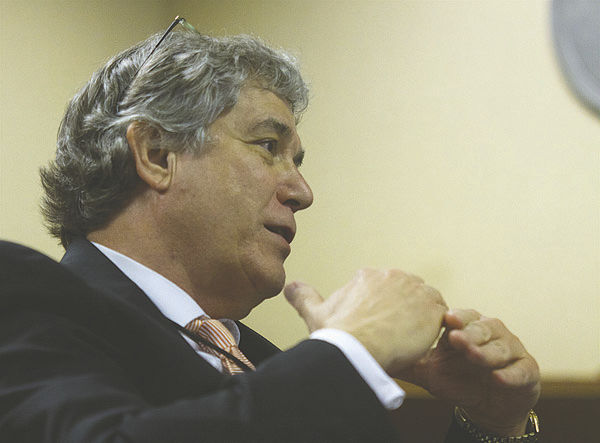Committee: Drainage tax a tight squeeze
Published 1:00 am Thursday, February 7, 2019

- Iberia Parish Government Legal Counsel Andy Shealy explained some of the history behind the parish government, which highlighted the challenge of making millage adjustments with other legal funding commitments.
The Iberia Parish Council’s Ad Hoc Millage Committee did a deep dive on the parish’s drainage facilities and infrastructure budget Wednesday night and came to the conclusion that even if the millage supporting drainage work was raised to its maximum, the operation would continue to run at a deficit.
Trending
“I don’t see a lot of fat there,” said Chairman Armond Schwing. “Even if we were to say, ‘Let’s cut $100,000,’ we’d have to go straight to payroll to make the cuts.”
Schwing did say the parish is making progress, but even the current 2019 budget depends on taking $539,784 from the previous years funding — basically from savings — to balance.
“It looks like the overall expense budget is down 17 percent, and salaries are down 13 percent,” Schwing said. That’s a positive. But if you keep dipping into the fund balance, that gets scary.”
If the 2019 budget projection is accurate, the drainage fund balance will end the year at $3.7 million.
Currently, the parish is charging property owners 3.45 mills annually for drainage work. That can be raised to 4 mills if the council should decide on that course. Each mill of tax raises just over $600,000.
Maxing out the millage, though, would only raise an additional $333,000. That would decrease the dependence on the previous years balance, but not eradicate the need for additional cash.
Trending
District 13 Councilman Marty Trahan brought up another issue facing the government. A proposal being addressed from the Metropolitan Planning Commission could bring a $5 million grant to the parish for drainage projects. That might require a 20 percent match, which would further deplete the fund balance.
“I would like to see us be able to save a little each year toward that,” Trahan said. “If we can land that, and something else comes up right behind it, we will have to have the matching funds on hand.”
With the numbers as they are, Schwing said, adding to the fund balance does not seem likely.
“Right now, you are operating each year at a deficit,” Schwing said. “Even pushing the millage all the way up still leaves you almost $200,000 short each year.”
All of the members of the committee agreed drainage was a high-priority issue. Troy Comeaux, a former parish councilman, said it may be the highest priority use of tax funds for many parish residents.
“At one of these meetings last year, we made a list of priorities,” Comeaux said. “Moving water was at the top of that list. If we don’t figure out a way to keep the water moving, you are going to see property values drop.”
Comeaux suggested that if any millages were to be brought before the voters to be raised, one of them should be drainage.
“You need to raise the drainage millage and the contributions to the general fund,” Comeaux said. “All the other guys are just going to have to trim.”
Legal Counsel Andy Shealy said that is fine in theory, but the core purpose of the parish government is to provide other services.
“Parishes were organized for the purpose of providing for a jail, providing for a courthouse and a central government,” Shealy said. “There are mandated services that have to be provided. After that, then you can add drainage as a top priority.”
Council Chairman Paul G. Landry said the system in place is suffering from the changes that the drop in royalty funds over the last four years.
“In the past, there was so much oil money coming in if there was a shortfall they would just roll a million into the road program,” Landry said.
Schwing suggested that prior to the committee’s next meeting the parish council staff collect millage information from surrounding parishes and look at how they are covering expenses.
“If someone has a better idea, then we can steal it from them,” Schwing said.
“Other parishes still have some additional income,” Landry said. “In St. Martin Parish, they are making $3.5 million each year on video poker. So it is not an apples to apples comparison.”
“Right now, we really don’t have a benchmark,” Schwing said. “Maybe we can get that from looking at them.”





